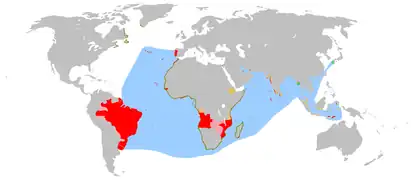State of Grão-Pará and Rio Negro Estado do Grão-Pará e Rio Negro | |||||||||
|---|---|---|---|---|---|---|---|---|---|
| 1772–1775 | |||||||||
.svg.png.webp) Flag
.svg.png.webp) Coat of arms
| |||||||||
.png.webp) Map of the State of Grão-Pará and Rio Negro in 1772 | |||||||||
| Status | State of the Portuguese Empire | ||||||||
| Capital | Santa Maria de Belém | ||||||||
| Common languages | Portuguese | ||||||||
| Religion | Roman Catholicism | ||||||||
| Government | Monarchy | ||||||||
| Monarch | |||||||||
• 1772–1775 | Joseph I | ||||||||
| Governor General | |||||||||
• 1772–1775 | João Pereira Caldas | ||||||||
| History | |||||||||
• Established | 1772 | ||||||||
• Disestablished | 1775 | ||||||||
| Currency | Portuguese Real | ||||||||
| |||||||||
The State of Grão-Pará and Rio Negro (Portuguese: Estado do Grão-Pará e Rio Negro) was one of the states of the Portuguese Empire.
History
The state was created in 1772 by order of Sebastião José de Carvalho e Melo, 1st Marquis of Pombal, the Secretary of the State for Joseph I of Portugal.[1]
The state was created because of the economic success of the State of Grão-Pará and Maranhão. Sebastião José de Carvalho e Melo split that state into two states, the State of Grão-Pará and Rio Negro and the State of Maranhão and Piauí, thinking that this would cause even better economic conditions, though the state split would prove a failure.
In 1775, due to economical issues in Belém and São Luis, both the State of Grão-Pará and Rio Negro and the State of Maranhão and Piauí were merged into the State of Brazil, formally unifying Portuguese America into one colony. However, the State of Grão-Pará and Rio Negro would remain autonomous of the Brazilian colonial government until 1823, when it would formally join the Empire of Brazil[2]
References
- ↑ Pará também nasceu de uma divisão
- ↑ Abreu e Lima, José Ignácio de (1845). Synopsis ou deducção chronologica dos factos mais notaveis da historia do Brazil [Synopsis or chronologial deduction of the most notable facts of the history of Brazil]. Brazil: M. F. de Faria. p. 448. Retrieved 1 February 2022.
